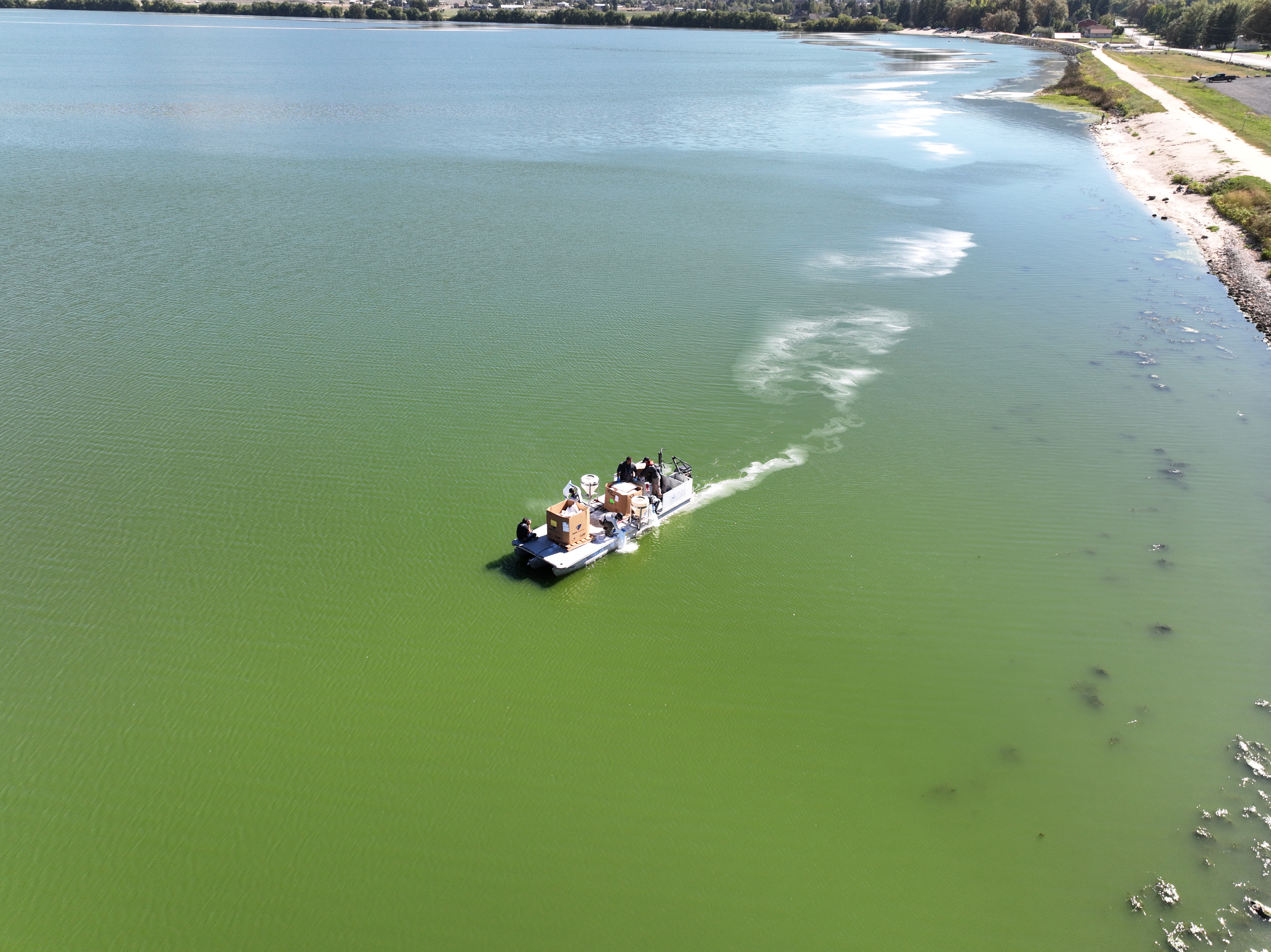Climate Change
See the First-Ever Photographs of the Elusive Mount Lyell Shrew, Finally Caught on Camera in California
A group of young researchers captured and photographed the animal on a three-day expedition to the Eastern Sierra Nevada
Welcome to the Pyrocene
Human use of fire has produced an era of uncontrolled burning
How Cleaning Up Harmful Algal Blooms Could Help Fight Climate Change
A company called BlueGreen Water Technologies aims to remove carbon dioxide from the atmosphere while also fighting algae’s toxic effects on people and the environment
The Enduring Mystery of a Plane That Vanished in the Icy Canadian Wilderness With 44 People On Board
Seventy-five years ago, a Douglas C-54D Skymaster disappeared en route from Alaska to Montana. No trace of its crew and passengers, including a pregnant mother and her young son, has ever been found
How to Use Renaissance Paintings to Improve the Farming of Tomorrow
An arboreal archaeologist roots around the Italian countryside and in centuries-old frescoes for a cornucopia of fruits long forgotten—but still viable to grow and consume
President Trump Orders the U.S. to Exit the World Health Organization and Paris Climate Agreement on His First Day in Office
The actions will take effect in a year, reinstating withdrawals he had set in motion during his first term
Hawaiian Observatory Clocks Highest Annual Jump in Atmospheric Carbon Dioxide Since Its Records Began 67 Years Ago
The change measured by the Mauna Loa Observatory was likely driven by wildfires and continued burning of fossil fuels, scientists say
L.A. Fire-Fueling Winds Slow Down, Offering a Short Reprieve. What Are the Santa Ana Winds, and Why Do They Fan the Flames?
The seasonal gusts have exacerbated the deadly fires, and they’re expected to pick back up next week
The Moon Makes the List of the World's Most Endangered Cultural Heritage Sites in 2025
Earth-bound landmarks ravaged by war, climate change, tourism and other threats also landed in the World Monuments Watch report
Climate Activists Spray-Paint Warning on Charles Darwin's Grave
The two protesters hoped to draw attention to reports that global temperatures in 2024 exceeded 1.5 degrees Celsius above pre-industrial levels for the first time
Melting Ice Reveals Remains of 5,900-Year-Old Trees in Wyoming, Uncovering a Long-Lost Forest
Researchers discovered more than 30 dead whitebark pine trees that were entombed in ice for millennia, representing a bygone ecosystem that could teach us about climate change
Scientists Drill 1.7 Miles Into Antarctic Ice, Revealing 1.2 Million Years of Climate History
Researchers say a collected sample is the longest continuous record of Earth’s past climate from an ice core
Freshwater Animals Are More Fragile Than Thought, With Nearly a Quarter Threatened With Extinction, Study Finds
Species in Lake Victoria, Lake Titicaca, Sri Lanka’s Wet Zone and the Western Ghats of India are particularly vulnerable to the effects of agriculture, human infrastructure and climate change, per the paper
Inside One Scientist’s Quest to Understand Why Climate Change Is Making Europe’s Highest Peak More Dangerous
Geomorphologist and veteran climber Ludovic Ravanel is learning how Mont Blanc is shifting—and sharing his discoveries with the Alpine community
Seven Ways to Explore Alaska's Endangered Glacial World
With the state’s glaciers retreating at alarming rates, there is no time like now to trek, climb, paddle and fly to see them
Meet the Tiny, Adorable Owls That Have Mastered the Art of Hiding
One of the smallest owls in North America, the northern saw-whet lives among us and is rarely seen—but one volunteer science project aims to find them and uncover their secrets year after year
Seven Scientific Discoveries From 2024 That Could Lead to New Inventions
From indestructible tardigrades to body-merging comb jellies, animals can teach humans so much about medicine, robotics, aging and survival
A Brilliant Folk Musician Turned the Natural Sounds of the Blue Ridge Mountains Into Powerful Songs
Daniel Bachman is on a mission to evoke Virginia’s past through strange medleys of sounds
The Ten Most Significant Science Stories of 2024
From a total solar eclipse that captivated our continent to record temperatures that scorched the planet, these were the biggest moments of the year
This Once-Rare Lizard Bounced Back From the Brink of Extinction After 'Painstaking' Restoration Efforts in the Caribbean
In 2018, fewer than 100 Sombrero ground lizards remained on Sombrero Island—but now, more than 1,600 of the critically endangered reptiles are scampering around the limestone landscape
Page 1 of 92
:focal(1457x1526:1458x1527)/https://tf-cmsv2-smithsonianmag-media.s3.amazonaws.com/filer_public/e5/6d/e56d993f-2e9c-44e0-9694-f0ef8cc34b83/lyell_shrew_on_natural_background.jpg)
:focal(800x602:801x603)/https://tf-cmsv2-smithsonianmag-media.s3.amazonaws.com/filer_public/0c/6e/0c6e5d6a-d7da-4460-a27f-eecdb4187a2e/gettyimages-2195403676_web.jpg)

:focal(700x527:701x528)/https://tf-cmsv2-smithsonianmag-media.s3.amazonaws.com/filer_public/a0/51/a051372d-951b-4402-a53b-b01117e21eaf/skymaster.jpg)
:focal(700x527:701x528)/https://tf-cmsv2-smithsonianmag-media.s3.amazonaws.com/filer_public/e5/56/e5560b08-f68c-43c1-961c-036a88b12067/smithmag-podcast-s03-ep01-fruit-article.jpg)
:focal(3883x2607:3884x2608)/https://tf-cmsv2-smithsonianmag-media.s3.amazonaws.com/filer_public/51/41/5141e2be-d420-41ae-83f4-e59d16686da3/gettyimages-2194978978.jpg)
:focal(2880x1920:2881x1921)/https://tf-cmsv2-smithsonianmag-media.s3.amazonaws.com/filer_public/1b/63/1b63f617-64bb-4b24-83df-3365d0bb93e1/gettyimages-619471998.jpg)
:focal(4094x2749:4095x2750)/https://tf-cmsv2-smithsonianmag-media.s3.amazonaws.com/filer_public/76/bb/76bbfe18-5b86-4a75-b347-2929b8cd8d27/gettyimages-2192558483.jpg)
:focal(521x419:522x420)/https://tf-cmsv2-smithsonianmag-media.s3.amazonaws.com/filer_public/d1/42/d1428560-2262-47e0-9612-7397ff13af4d/gpn-2001-000014.webp)
:focal(2560x1707:2561x1708)/https://tf-cmsv2-smithsonianmag-media.s3.amazonaws.com/filer_public/de/69/de698dfd-a838-4605-badb-3bc2bea86f9d/gettyimages-2193146952.jpg)
:focal(1050x790:1051x791)/https://tf-cmsv2-smithsonianmag-media.s3.amazonaws.com/filer_public/99/a0/99a0a9a3-6197-404e-a955-e1cae85a9958/img_1940.jpeg)
:focal(960x722:961x723)/https://tf-cmsv2-smithsonianmag-media.s3.amazonaws.com/filer_public/52/cd/52cdf69c-c09a-4230-a5cf-17fe5cc00f5b/csm_img-20241120-wa0001_39aadf7fd6.jpg)
:focal(600x400:601x401)/https://tf-cmsv2-smithsonianmag-media.s3.amazonaws.com/filer_public/fa/fd/fafd0bcd-9636-4da1-b3a5-98c98bc7a5e2/crayfish.jpg)
:focal(800x602:801x603)/https://tf-cmsv2-smithsonianmag-media.s3.amazonaws.com/filer_public/80/89/80890aba-62f9-4f41-8585-39d19a93f8e8/gettyimages-2160559347_web.jpg)
:focal(512x346:513x347)/https://tf-cmsv2-smithsonianmag-media.s3.amazonaws.com/filer_public/0c/33/0c336315-06ae-4f55-be50-c69721fcb6d0/gettyimages-1241862329.jpg)
:focal(2000x1952:2001x1953)/https://tf-cmsv2-smithsonianmag-media.s3.amazonaws.com/filer_public/3e/70/3e70dcab-8d5a-426a-8184-83c475b0af90/gettyimages-813140808.jpg)
:focal(1061x707:1062x708)/https://tf-cmsv2-smithsonianmag-media.s3.amazonaws.com/filer_public/b3/5c/b35cff10-8d1d-413b-b05f-af04c0f55eb0/gettyimages-591212519.jpg)
:focal(1260x840:1261x841)/https://tf-cmsv2-smithsonianmag-media.s3.amazonaws.com/filer_public/43/77/4377c520-53f6-437d-901b-9df6d256795e/janfeb2025_a09_prologue.jpg)
:focal(800x602:801x603)/https://tf-cmsv2-smithsonianmag-media.s3.amazonaws.com/filer_public/0d/62/0d620de3-b26c-4118-90d6-21b460317e95/topsciencestories2024_web.jpg)
:focal(512x302:513x303)/https://tf-cmsv2-smithsonianmag-media.s3.amazonaws.com/filer_public/ae/68/ae68645f-b2f8-4cbd-a069-2e386e4b843c/feature_sombrerogroundlizardpr.webp)